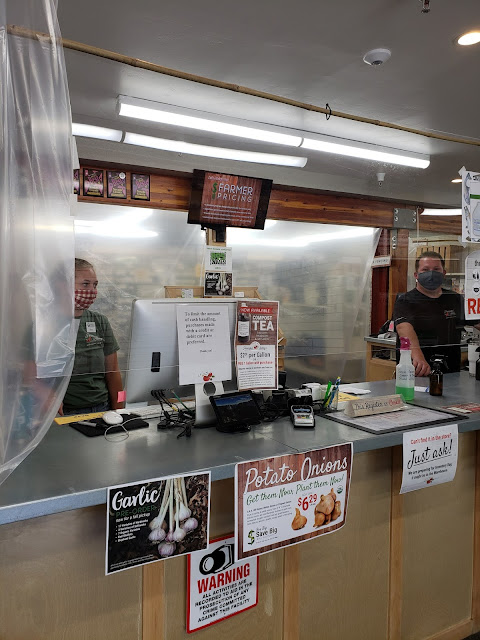

|
|
Before reopening to the public, Peaceful Valley Farm & Garden Supply installed
several precautions, including plastic protectors at its checkout counter. (Photo
courtesy PVFGS)
|
Will renewed interest in gardening continue after COVID is gone?
If the experience of one popular supplier is any indication, it’s highly likely that the pandemic has given root to a new generation of serious gardeners.
Synonymous with all things organic and a go-to source for gardeners (and farmers) for decades, Peaceful Valley Farm & Garden Supply has ridden spikes of orders and lows of shutdowns during this year like no other.
“We knew in the very beginning of March that we were running out of seed,” said Peaceful Valley owner Patricia Boudier. “That seed should have lasted us all year.”
Headquartered in Grass Valley, Peaceful Valley ranks as the nation’s largest organic farm and garden supply company, with tens of thousands of customers nationwide.
“We started to see a huge surge in seed sales in February,” Boudier said. “People were listening to the news and those early reports about (coronavirus).”
Boudier recalled other news-driven boons in seed sales. There was a spike in advance of Y2K and another right after 9/11.
“People worry about food sources,” she said, “and they start to garden.”
Founded in 1976, Peaceful Valley has withstood many challenges during its long run as an organic pioneer. But nothing could prepare Boudier and her 60-person staff for this pandemic-fueled demand. Even putting a $100 minimum on new orders didn’t stop the surge.
“We couldn’t deal with thousands and thousands of orders at one time,” she said. “We couldn’t get our seed packets printed fast enough. We worked all night to fill orders. We sent out seeds in plain brown wrappers.”
What were people buying? Peaceful Valley’s best sellers of 2020: Scarlet Nantes carrots, Genovese basil, cilantro, Bloomsdale spinach and Calabrese broccoli. Apple and pear trees were popular, too.
When California declared a statewide shelter-in-place order March 19, Peaceful Valley’s whirlwind business came to a sudden halt.
“We closed completely for one day so I could gather my thoughts and do some research,” Boudier said. “As a farm supply, we’re an essential business, so we could stay open. We closed our (Grass Valley) store and nursery until we could be sure we could open safely.
“Then, we had all these employees who couldn’t come to work because they have little kids and needed to stay at home,” she added. “We still did online orders, but we had to close that down for a week just so we could catch up.”
Peaceful Valley gradually reopened its store and nursery. Only five or six people are allowed inside at a time. Masks are required. Plexiglas and plastic shields shroud the counters.
“We fully reopened our call center, but we still didn’t have enough people,” Boudier said. “Some of our (employees) took leave; they didn’t want to risk exposure.”
Four months into the pandemic, Peaceful Valley has found some peace. “This (crisis) has actually helped us be more efficient,” said Boudier, adding that her company took this opportunity to migrate its online business to a new web platform.
This summer, business has remained strong. Sales for July are up about 22% compared to last year.
“Anything edible is flying off the shelves,” she said. “Even sprouting seeds (such as mung beans and alfalfa); I was surprised by how many people wanted to do their own sprouts. Even if they have no room for a garden, they can grow their own microgreens.”
Boudier expects this boom in organic gardening interest to outlast the pandemic.
“I’ve talked to so many people who put in their first garden ever; they’re so excited,” she said. “People are gravitating towards keeping their food sources protected. They want to grow their own food.”
Planning a fall garden? Check out Peaceful Valley’s website
at
www.groworganic.com
.
Comments
0 comments have been posted.Sacramento Digs Gardening to your inbox.
Sites We Like
Garden Checklist for week of April 21
This week there’s plenty to keep gardeners busy. With no rain in the immediate forecast, remember to irrigate any new transplants.
* Weed, weed, weed! Get them before they flower and go to seed.
* April is the last chance to plant citrus trees such as dwarf orange, lemon and kumquat. These trees also look good in landscaping and provide fresh fruit in winter.
* Smell orange blossoms? Feed citrus trees with a low dose of balanced fertilizer (such as 10-10-10) during bloom to help set fruit. Keep an eye out for ants.
* Apply slow-release fertilizer to the lawn.
* Thoroughly clean debris from the bottom of outdoor ponds or fountains.
* Spring brings a flush of rapid growth, and that means your garden is really hungry. Feed shrubs and trees with a slow-release fertilizer. Or mulch with a 1-inch layer of compost.
* Azaleas and camellias looking a little yellow? If leaves are turning yellow between the veins, give them a boost with chelated iron.
* Trim dead flowers but not leaves from spring-flowering bulbs such as daffodils and tulips. Those leaves gather energy to create next year's flowers. Also, give the bulbs a fertilizer boost after bloom.
* Pinch chrysanthemums back to 12 inches for fall flowers. Cut old stems to the ground.
* Mulch around plants to conserve moisture and control weeds.
* From seed, plant beans, beets, cantaloupes, carrots, corn, cucumbers, melons, radishes and squash.
* Plant onion sets.
* In the flower garden, plant seeds for asters, cosmos, celosia, marigolds, salvia, sunflowers and zinnias.
* Transplant petunias, zinnias, geraniums and other summer bloomers.
* Plant perennials and dahlia tubers for summer bloom.
* Mid to late April is about the last chance to plant summer bulbs, such as gladiolus and tuberous begonias.
* Transplant lettuce seedlings. Choose varieties that mature quickly such as loose leaf.